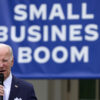As I listened to the acceptance speeches at the Academy Awards, I was struck by the constant references to a long litany of human and other rights now denied. Each charge brought the black-tied, silk-gowned audience to their feet, wildly applauding and cheering.
Nearly every imaginable right was mentioned—women’s rights, civil rights, incarceration rights, immigration rights, even sanitation rights, if I heard correctly. Hollywood used to be in the entertainment business. It now seems caught up in agitation and propaganda.
As the hours went by and the number of filmic categories grew and grew, I realized one important category was overlooked: conservative movies.
The lives of many conservatives would make outstanding movies and test the acting chops of Hollywood’s finest actors. In addition, there are numerous conservative books that could be adopted for the screen.
In the interest of a more representative Academy Awards, I offer a list of eight conservative movies that ought to be made. The list is just the tip of the iceberg and does not include a single story from behind the Iron Curtain, such as the heroic life of Milada Horakova of Czechoslovakia, that deserves to be told.
- “Witness.” The dramatic story of Whittaker Chambers, the Soviet spy turned anti-communist, who confronts fellow spy Alger Hiss, the golden boy of liberalism, before a Congressional committee. No novelist could write a more compelling script of conflicting personalities and beliefs, of good versus evil. “Witness” was a bestselling book that influenced the thinking of many, including Ronald Reagan. The late Philip Seymour Hoffman, rumpled and overweight, would have been a perfect Chambers.
- “Saving the Queen.” This was National Review founder Bill Buckley’s first spy novel starring Blackford Oakes, the intrepid Yalie turned CIA agent. Oakes’ mission is to discover how Soviet agents in Britain are learning the secrets of the American H-bomb, supposedly known only to the prime minister and the Queen of England. In the course of bedding the youthful queen, Oakes learns that her cousin is passing secrets to the Soviets. In Buckley’s lively spy novels, unlike those of John le Carré, the CIA and the KGB are not mirror images of each other any more than America and Soviet Russia are. In a Buckley novel, the Americans are always the good guys. The perfect actors for Oakes and the queen would be Benedict Cumberbatch and Keira Knightley, who are so marvelous opposite each other in “The Imitation Game.”
- “Missionary for Freedom.” A biopic of Dr. Walter H. Judd, who was a medical missionary in China, a political missionary in Congress, and a missionary-at-large in his post-Congress retirement. The movie focuses on his years in China when he ministered to communists, was kidnapped and almost killed by bandits, and was a prisoner of the Japanese for almost a year. After securing his freedom in 1938, Judd returns to America where he warns Congress and the public of the coming war with Japan. A young version of James Wood would be an excellent choice to play Judd.
- “The Strategic Game.” How the Strategic Defense Initiative convinced the Soviets they could not match U.S. technical expertise and abandoned the arms race, leading to the end of the Cold War. The climax of the movie is the tense summit meeting between Reagan and Mikhail Gorbachev at Reykjavik when everybody but Reagan is willing to give up SDI for a nuclear arms deal. Tom Selleck, sans moustache, has the gravitas and sense of humor necessary for a convincing President Reagan.
- “A Choice Not an Echo.” A biopic of Phyllis Schlafly, the first lady of American conservatism, who single-handedly defeated the Equal Rights Amendment backed by every sector of the liberal establishment. The movie shows how Schlafly, through her powerful personality, molds a group of housewives and professional women into a political force that stops the ERA in state legislatures like Illinois. The woman portraying Schlafly, whom Richard Viguerie calls 001, for her life-long service to the conservative movement, would have to be an iron lady like Margaret Thatcher.
- “Hollywood Red.” The true story of the Hollywood Ten, who were not liberal Democrats but Communist Party members and compliant supporters of the Soviet Union. The movie is based on Allan Ryskind’s new book, “Hollywood Traitors,” that proves the alleged “victims” of the Hollywood blacklist to be enthusiastic Stalinists committed to a socialist America. A key scene is the testimony of anti-communists Reagan, Gary Cooper, Robert Taylor and other Hollywood stars before the House Committee on Un-American Activities. The movie is narrated by screenwriter and Pulitzer Prize winner Morrie Ryskind.
- “The Monk of Mecosta.” The moving story of the reclusive conservative historian, Russell Kirk, who influenced tens of thousands of young people with his many books, lectures and debates and gave the conservative movement its name with his seminal work “The Conservative Mind.” The story is told through the eyes of his beautiful young wife Annette and their four daughters who dote on their father’s ghost stories and old-fashioned ways: he does not drive or watch TV. Kirk calls his home “The Last Homely Home” and welcomes Vietnamese, Polish and other anti-communist dissidents, some of whom stay for years. A key scene is the famed journalist Malcolm Muggeridge’s holiday visit to Mecosta.
- “Airborne.” More than anything else—with the possible exception of skewering liberals—Buckley loved to sail. This is the story of his storm-tossed journeys across the Atlantic and Pacific oceans with his son Christopher and close friends, cosseted by gourmet meals and wines, cigars from “21”, and tapes of music from Bach to Basie. However, on the voyage across the Pacific, there are squalls and winds of fifty miles an hour, leaving the sailors continually drenched. Although they do not encounter a perfect storm, the Buckley crew is tested as few amateur sailors are. Who better to play Bill Buckley than George Clooney?
What next? Lights! Camera! Action!






























